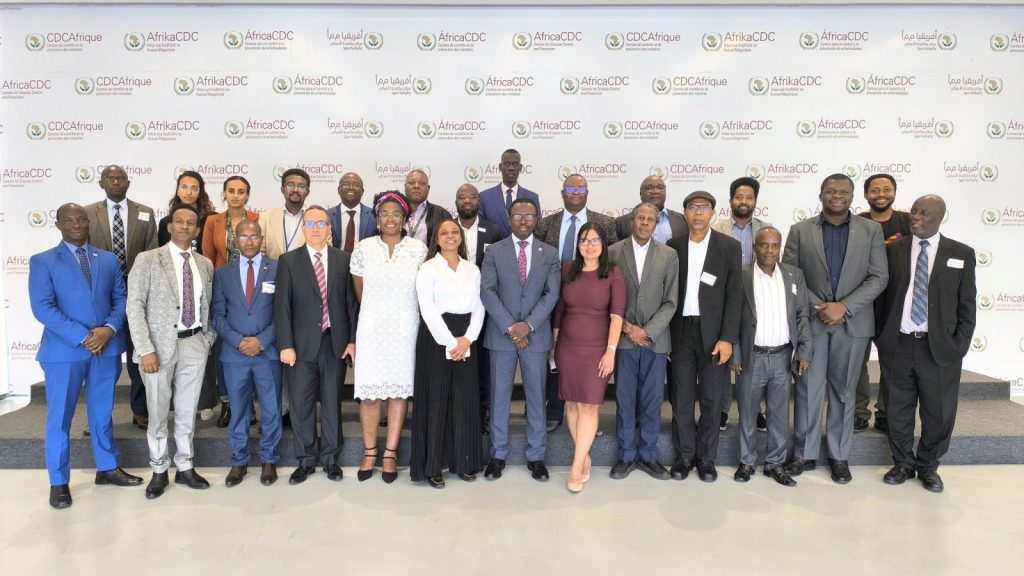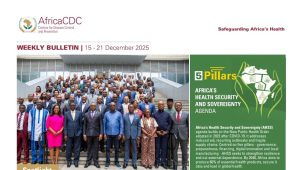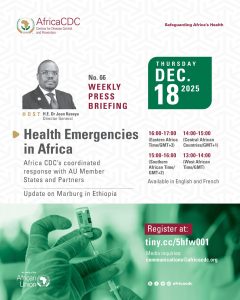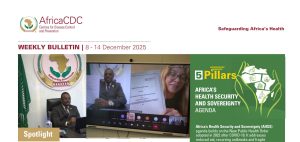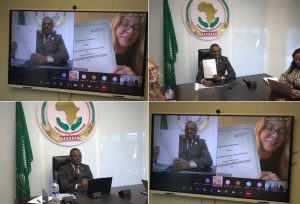The Africa Centres for Disease Control and Prevention (Africa CDC) has begun implementing a bold decision by the African Union (AU) to address the continent’s health workforce challenges through a social compact. This initiative aims to strengthen Africa’s health workforce, which currently bears 24% of the global disease burden but represents only 3% of the world’s health workers.
The Global Strategy for Health Workforce 2030 estimates that an additional 6.1 million health workers will be needed in Africa by 2030 to achieve universal health coverage (UHC) targets. Recognizing the critical role the health workforce plays in ensuring health security across the continent, Africa CDC has made workforce development a central pillar on the new public health order and its 2023-2027 strategic plan.
At the 35th General Assembly of the African Union Heads of State and Government in February 2022, H.E. Cyril Ramaphosa, President of the Republic of South Africa and Former champion of the African Union COVID-19 Commission and the current pandemic preparedness, prevention, and response commission, called for the creation of an AU Health Workforce Task Team. This team is tasked with addressing the current and future health workforce needs of the continent and implementing Africa CDC’s Health Workforce Development agenda through a social compact with AU Member States.
In response, Africa CDC has taken steps to develop the foundational documents necessary to move this vision forward. From July 10 to 12, 2024, Africa CDC hosted an inception workshop that brought together participants from AU Member States, the former COVID-19 commission, and various technical departments of the Africa CDC. The workshop had two primary objectives: co-creation of plans and processes for developing the Health Workforce Compact and agreement on key considerations to be included in the initiative’s deliverables.
“This is an agenda that enjoys widespread support, particularly from the Heads of State,” said Dr. Raji Tajudeen, Acting Deputy Director General of Africa CDC and Head of Public Health Institutes and Research, during his official opening of the conference.
The foundational work aims to produce a comprehensive report outlining the current state of the health workforce in Africa. It also seeks to develop an investment case for advocating additional resources, establish a Health Workforce Compact, and set standards for its medium- and long-term implementation. Key metrics and evaluation mechanisms will be designed to monitor progress.
Several crucial topics were highlighted during the meeting. Participants discussed both the positive and negative impacts of health workforce migration, including the benefits of remittances for national economies. Some Member States emphasized the importance of country-to-country agreements, including penalties for healthcare workers who do not return and time-bound arrangements for those wishing to work abroad temporarily. Strategies to retain health workers in rural areas were explored, including hiring private practitioners as civil servants, offering higher salaries, improving local amenities, and addressing security concerns. It was agreed that a multisectoral approach is necessary.
The role of traditional practitioners, especially during the COVID-19 pandemic, was discussed. While there was interest in upskilling practitioners like Traditional Birth Attendants, concerns were raised regarding the lack of legal recognition and standardized criteria for their services. The importance of a country-led process with early and ongoing ministerial involvement was emphasized to ensure political buy-in and ownership. Key stakeholders identified included ministries of health, labour, and education, National Public Health Institutes, Civil Society Organizations, and the private sector.
“This document will serve as an advocacy tool to convince our counterparts from various sectors to view the health workforce as an investment,” Dr. Tajudeen remarked.
Dr. Lwazi Manzi, representing the Pandemic Preparedness, Prevention, and Response commission in the South African Presidency, urged participants to raise significant issues with the commission through Africa CDC. She reiterated His Excellency’s commitment to realizing this ambitious decision made by the AU Assembly.
The Health Workforce Compact team plans to continue regional consultations, develop legal instruments for the compact, and design key metrics for tracking progress.
Dr. Tiruneh Amsalu Baye, Technical Officer for Public Health Workforce Development at Africa CDC and coordinator of the project, emphasized that implementing the Workforce Compact will require collaboration with all relevant stakeholders. “The decision to develop the Health Workforce Compact was made by the AU Heads of State and Government. As we implement this compact, there is an expectation to report back to them on our progress,” Dr. Tiruneh said. “We cannot drive this agenda alone. We need partners,” added Dr. Tajudeen.

